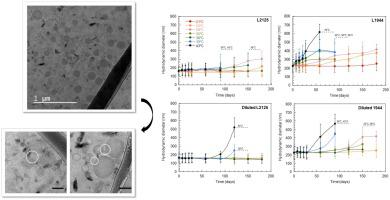Colloids and Surfaces B: Biointerfaces ( IF 5.4 ) Pub Date : 2020-07-03 , DOI: 10.1016/j.colsurfb.2020.111242 L Benrabah 1 , K Kemel 2 , C Twarog 1 , N Huang 1 , A Solgadi 3 , C Laugel 2 , V Faivre 1

|
The aim of this paper is to investigate the time and thermal stability of innovative multicompartmental nanoparticles. These particles, having a hydrophilic side and a hydrophobic side, belong to the family of Janus particles and are promising tools to carry active ingredients with opposite solubilities in a unique nanocarrier. The stability of nanoparticles obtained with mainly two types of polyoxylglycerides (Labrafil® M2125 CS and Labrafil® M1944 CS) has been investigated. The suspensions describe a two-step maturation/destabilization process with an Ostwald ripening phase followed by the coalescence of the particles. The effect of lipid composition and temperature on these steps has been investigated in deep as stability with temperature is a critical parameter to consider in order to envisage the development of any formulation for pharmaceutical or cosmetic uses. These nanoparticles were particularly stable at room temperature as their hydrodynamic diameter did not change significantly for 20 months. Contrarily, a strong dependency to temperature appears when storage temperature increases from 25 °C to 43 °C. Indeed, Labrafil® M1944 CS seemed to undergo a progressive destabilization where a significant increase of particles size is visible from 25 °C and phase separation occurred after 4 months at 32 °C. At the opposite, Labrafil® M2125 CS remained stable until 36 °C and reached a threshold temperature between 32 °C and 36 °C after which Labrafil® M2125 CS underwent a consequent increase of particles size at the longer time, i.e. after 6 months. Moreover, Labrafil® M2125 CS formulation was stable at least 3 months at 43 °C.
中文翻译:

用于制药和化妆品应用的基于脂质的 Janus 纳米粒子:动力学和随时间和温度的不稳定机制。
本文的目的是研究创新的多室纳米粒子的时间和热稳定性。这些具有亲水面和疏水面的颗粒属于 Janus 颗粒家族,是在独特的纳米载体中携带具有相反溶解度的活性成分的有前途的工具。已经研究了主要用两种类型的聚氧甘油酯(Labrafil® M2125 CS 和 Labrafil® M1944 CS)获得的纳米粒子的稳定性。悬浮液描述了一个两步的成熟/去稳定过程,在 Ostwald 成熟阶段之后是颗粒的聚结。已经深入研究了脂质成分和温度对这些步骤的影响,因为温度稳定性是要考虑开发任何用于药物或化妆品用途的制剂的关键参数。这些纳米颗粒在室温下特别稳定,因为它们的流体动力学直径在 20 个月内没有显着变化。相反,当储存温度从 25 °C 增加到 43 °C 时,会出现对温度的强烈依赖性。事实上,Labrafil® M1944 CS 似乎经历了渐进的不稳定,从 25 °C 开始可以看到颗粒尺寸的显着增加,并且在 32 °C 下 4 个月后发生相分离。在对面,Labrafil® M2125 CS 在 36 °C 之前保持稳定,并达到 32 °C 和 36 °C 之间的阈值温度,之后 Labrafil® M2125 CS 在更长的时间(即 6 个月后)经历了随之而来的粒度增加。此外,Labrafil® M2125 CS 配方在 43 °C 下至少可稳定 3 个月。











































 京公网安备 11010802027423号
京公网安备 11010802027423号